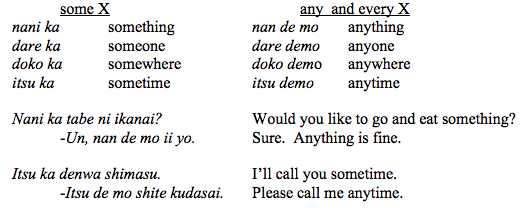2.3: 会話3
- Page ID
- 31570
Mrs. Yamamoto explains recycling.
Yamamoto: Sore wa sutete wa ikemasen yo. それは、捨 す ててはいけませんよ。You shouldn’t throw those away.
Michael: Kono bin ya kan mo? このビンや缶 かん も? Do you mean these bottles and cans, too?
Yamamoto: Onaji desu. Mottainai deshou? 同 おな じです。もったいないでしょう?Same. It would be wasteful, wouldn’t it?
Michael: Nan de mo risaikuru-suru n desu nee. 何 なん でもリサイクルするんですねえ。 You recycle everything, don’t you?
Vocabulary
suteru すてる 捨てる throw away, discard
ikenai いけない won’t do; bad; mustn’t do
sutete wa ikenai すててはいけない 捨てては行けない should not throw away
bin びん ビン bottle; jar
kan かん 缶 can
+petto botoru ペットボトル plastic bottle
+gomi ごみ trash
+gomibako ごみばこ ゴミ箱 trash can
onaji おなじ 同じ same
(a noun: no no or na is required to modify a noun: onaji namae ‘same name’)
+chigau ちがう 違う is different; is wrong
(an U-verb: chigaimasu, chigawanai, chigatta: chigau namae ‘different name’)
mottai nai もったいない wasteful; sacrilegious
x de mo X でも even X
nan demo なんでも 何でも anything
risaikuru リサイクル recycle
Grammar Notes
Expressing Prohibition ‘Must not’
The /X~te + wa/ pattern proposes a condition ‘if you do X’. When followed by ikenai/ ikemasen ‘it cannot go’ or ‘it won’t do’, it expresses prohibition ‘it’s no good if you do X’ or ‘you must not do X.
Sutete wa ikemasen. It’s no good if you throw it away.
Shashin o totte wa ikenai. It’s no good if you take pictures.
In addition to ikenai, other negative expressions such as dame, yoku nai, shitsurei, etc. sometimes follow the /~te wa/ pattern.
Mada mite wa dame. You must not look yet.
Osoku denwa-shite wa shitsurei desu. It’s rude to call late.
In casual speech, the following sound contractions often occur:
/te wa/ -> /cha(a) / and /de wa/ -> /ja(a) /
sutete wa ikenai -> sutecha(a) ikenai You must not throw it away.
nonde wa ikenai -> nonja(a) ikenai You must not drink it.
Note that permission and prohibition are the ‘yin and yang’ of the rule, so to speak. In many contexts, the /~te mo ii/ and /~te wa ikenai/ express opposite sides of the same rule.
Tabako suttee mo ii desu ka. May I smoke?
-Iya, sutte wa ikemasen. No, you mustn’t.
Be aware that prohibiting someone from doing something may be rude in some situations. Use more indirect patterns in such cases including chotto, sumimasen kedo…, and negative requests.
Tabako suttee mo ii desu ka? May I smoke?
-Chotto…
-Anoo, sumimasen kedo….
-Sumimasen kedo, suwanai de itadakemasen ka.
-Moushiwake arimasen kedo, goenryo kudasaimasen ka.
Noun de mo
We learned earlier that de mo placed before a sentence means ‘However’ or ‘But’. It comes from ‘Soo de mo,’ which literally means ‘even if it is so.’ This is the noun version of the /~te mo/ pattern, which is introduced in Dialogue 2 above. Now, the combination of /de mo/ is attached to a noun as if it’s a particle and /X de mo/ means ‘even X’
Kodomo de mo wakarimasu. Even children can understand it.
Obentoo de mo ii desu yo. Even a bento is fine.
When combined with a question word, it means ‘any X’ or ‘every X’.
Nan de mo risaikuru-shimasu. We recycle anything (and everything.)
Dare demo shitte imasu. Any person knows it.
Itsu de mo ii desu yo. Any time is fine.
This pattern contrasts with /Question word +ka/, which was introduced earlier and means ‘some X’


